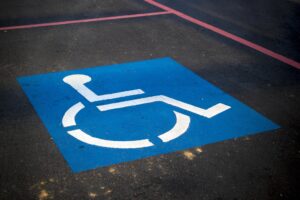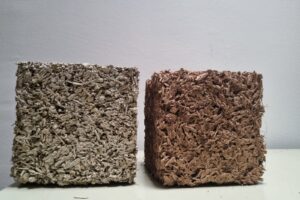
Compass+: Artificial intelligence and machine learning for maritime traffic management at the Port of Barcelona
June 26, 2024
PERMEPSY: A Predictive Tool to Personalise Psychosis Treatment
July 29, 202426/07/2024
The UPC coordinates the BCNMob project, focused on the use of smart glasses with 5G technology and extended reality to increase the autonomy of visually impaired people. Biel Glasses and the Punt de Vista Foundation are also participating in the project.
Forty percent of visually impaired people experience falls at least once a year, and 63% of these falls have medical consequences. These falls not only physically affect these individuals but also contribute to their social isolation and dependency due to the fear of falling again. The lack of personal autonomy results in an annual cost of more than 15,000 euros for visually impaired people.
In this context, the BCNMob project aims to reverse the situation through a pilot study directed by the Faculty of Optics and Optometry of Terrassa (FOOT) at the Universitat Politècnica de Catalunya - BarcelonaTech (UPC). Over thirty volunteers with visual impairments have participated in tests conducted in real urban environments in Barcelona. During the trials, they used the smart glasses developed by the company Biel Glasses, a technology made in Barcelona that incorporates 5G technology, artificial vision, and extended reality.
Extended reality combines elements of the real and virtual worlds, allowing them to interact in real-time. The smart glasses use this technology to provide visual indications adapted to the patients' visual capacities, enabling them to perceive risks they would not otherwise see.
The UPC coordinated the design and planning of the pilot study based on the research results from the doctoral thesis of Professor Eulalia Sánchez, co-founder of Biel Glasses. The objective of this first phase was to select suitable individuals to test the glasses, through the simulation of routes and situations in real urban environments where obstacles and other mobility risks are present.
To carry out these tests, a protocol was developed that established the number of users, inclusion and exclusion criteria, optometric tests to evaluate their suitability, tests with the device, and metrics to be analyzed. Statistical methods for analyzing the results and ethical and data protection aspects were also included.
Furthermore, the UPC team designed control systems for measuring both subjective (through surveys) and objective parameters. For the various types of tests, markers such as walking speed, obstacle recognition, increase in distances traveled autonomously, reduction of accompaniment hours, measurement of accessibility to certain facilities, and system usability were defined.
Biel Glasses' smart glasses allow users to detect and avoid urban obstacles such as steps, gaps, pedestrian crossings, and traffic lights, providing this information in real-time through indications adapted to their vision characteristics. Additionally, their technology enables high-precision navigation, based on artificial intelligence and the Galileo positioning system.
During the project, the usability, reliability, and safety of this new technology were evaluated. It is expected that the use of these glasses will increase the autonomy of visually impaired people, significantly improving mobility, universal accessibility, and quality of life.
The project is funded by the Barcelona City Council and the "la Caixa" Foundation under the 2022 call for research and innovation projects. The budget was nearly 60,000 euros, and the project has a duration of 18 months (March 2023 - September 2024).


Lluís Fortuny, who is taking part in the study, testing the smart glasses accompanied by Professor Lluís Pérez.
FOOT researchers and lecturers Salut Albà and Lluís Pérez
Technology
Sector
You want to know more?
Related Projects
- A research team from the inLab FIB at the Universitat Politècnica de Catalunya - BarcelonaTech (UPC), together with the Asociación de Personas con Movilidad Reducida (AsoPMR), has taken part in the Spot4Dis project to enhance the mobility and autonomy of people with reduced mobility.
- The La Volta project foresees the construction of a large Catalan vault pergola within the Llars Mundet campus, in the Montbau neighbourhood (Horta-Guinardó district). This structure will become a new architectural landmark for Barcelona, combining traditional construction techniques with contemporary innovation. The project involves the Rehabilitation and Architectural Restoration Research Group (REARQ), at the Universitat Politècnica de Catalunya - BarcelonaTech (UPC), and is led by the Architects’ Association of Catalonia (COAC) and the Barcelona Provincial Council.
SATE-VEG: A system for energy renovation of buildings that helps reduce the urban heat island effect
Researchers from the Architecture, Energy and Environment (AiEM) group at the Universitat Politècnica de Catalunya - BarcelonaTech (UPC) have developed SATE-VEG, an external thermal insulation system with a vegetal coating that offers seasonally adaptive thermal behaviour, enhances urban biodiversity and promotes positive health effects. The system is made from organic materials, requires low maintenance and consumes minimal water.- A research team from the Interdisciplinary Group on Building Science and Technology (GICITED) at the Universitat Politècnica de Catalunya – BarcelonaTech (UPC) is leading the BioSAFE project, which aims to develop sustainable building envelopes —mainly façades— designed according to sustainability, comfort and safety criteria, with particular attention to their acoustic behaviour and fire performance.




